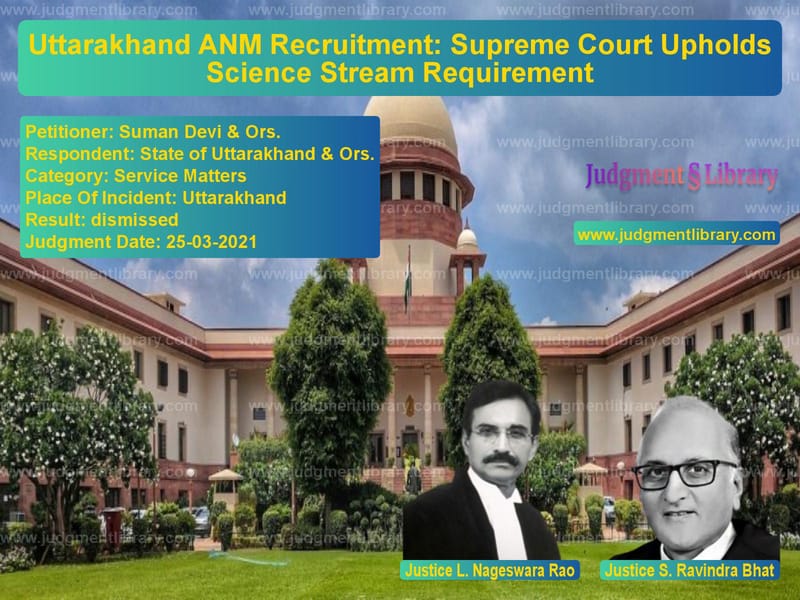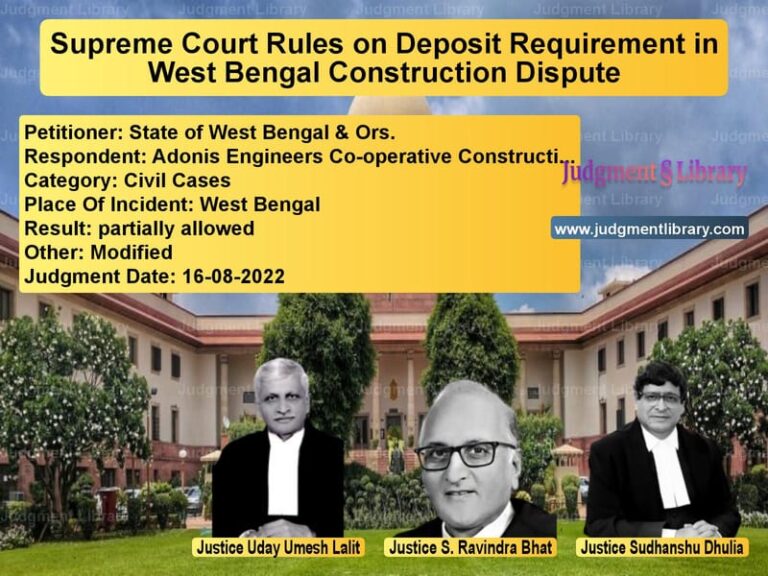Uttarakhand ANM Recruitment: Supreme Court Upholds Science Stream Requirement
The case of Suman Devi & Ors. vs. State of Uttarakhand & Ors. revolves around the eligibility criteria for the recruitment of Auxiliary Nurse Midwives (ANMs) in Uttarakhand. The Supreme Court examined whether candidates who had completed ANM training but did not have a science background in their intermediate education could be considered eligible for government employment.
Background of the Case
The Uttarakhand Government issued a recruitment advertisement on March 15, 2016, for 440 vacancies of Family Health Workers (FHWs) and ANMs. The notification, however, did not explicitly mention that candidates must have completed their intermediate education (10+2) with science subjects. Subsequently, the recruitment process was challenged on the ground that the eligibility criteria did not conform to the existing service rules, which required candidates to have studied science at the intermediate level.
The Uttarakhand High Court ruled in favor of the state government, upholding the requirement of a science background for recruitment as ANMs. The appellants, who had completed ANM training but did not have a science background in their intermediate education, challenged this decision in the Supreme Court.
Legal Issues Before the Supreme Court
The case raised several crucial questions:
- Whether the state government had the authority to mandate a science background for ANM recruitment.
- Whether the advertisement for recruitment, which did not mention the science requirement, could be relied upon to grant eligibility to non-science candidates.
- Whether the requirement of science in intermediate education violated constitutional rights of equality and equal opportunity.
Arguments by the Petitioners
The petitioners, who were trained ANMs but had studied arts or other non-science subjects at the intermediate level, made the following arguments:
- The requirement of science in intermediate education was arbitrary and had no rational nexus with the duties of an ANM.
- Their training as ANMs was identical to that of science-background candidates, and thus they should not be discriminated against.
- The recruitment advertisement did not mention any science requirement, and candidates applied in good faith believing they were eligible.
- Many existing ANMs working in Uttarakhand were from non-science backgrounds, proving that such a requirement was unnecessary.
Arguments by the Respondents (State of Uttarakhand)
The state government and its representatives argued:
- The recruitment rules, as amended in 1998 and subsequently in 2016, explicitly required ANM candidates to have an intermediate qualification in the science stream.
- The omission of the science requirement in the recruitment advertisement did not override the legally binding recruitment rules.
- The objective of requiring a science background was to ensure that ANMs had a foundational understanding of medical and biological concepts.
- Even if non-science candidates had undergone ANM training, the state government had the discretion to set additional qualifications for recruitment.
Supreme Court’s Analysis
1. Authority of the State Government in Setting Recruitment Criteria
The Supreme Court upheld the authority of the state government to prescribe educational qualifications for public employment. The Court stated:
- “The state government, as the employer, has the right to prescribe minimum qualifications for recruitment, including requiring a science background.”
- “The recruitment rules have statutory force and cannot be overridden by an administrative mistake or omission in an advertisement.”
2. Validity of the Science Requirement
The Court ruled that the requirement for science subjects in intermediate education had a rational nexus with the duties of an ANM. It observed:
- “ANMs are required to handle basic medical and health-related responsibilities, which necessitate a foundational understanding of biology and chemistry.”
- “The classification of candidates based on educational background is not arbitrary, as science education enhances the capability to understand and perform medical duties.”
3. Recruitment Advertisement vs. Service Rules
The petitioners contended that the recruitment advertisement did not mention the science requirement, leading to unfairness in the process. The Court, however, held:
- “An advertisement cannot override statutory recruitment rules.”
- “Candidates must be aware of the prevailing service rules before applying.”
- “The omission of the science requirement in the advertisement does not entitle non-science candidates to claim eligibility.”
4. Equal Opportunity and Discrimination Claims
The Supreme Court dismissed the argument that requiring science subjects in intermediate education amounted to discrimination:
- “Setting academic criteria for government employment is not unconstitutional unless it is shown to be manifestly arbitrary or unreasonable.”
- “The differentiation between science and non-science students is based on educational relevance and not on any arbitrary classification.”
Final Judgment
The Supreme Court dismissed the appeals and upheld the High Court’s ruling. The key findings were:
- The state government’s requirement that ANM candidates must have completed intermediate education with science subjects is valid and justified.
- The recruitment advertisement’s omission of the science requirement did not override the statutory rules governing recruitment.
- The classification between science and non-science candidates is reasonable and does not violate constitutional principles of equality.
- The appeals by the petitioners are without merit and are accordingly dismissed.
Implications of the Judgment
This ruling has significant implications for public sector recruitment policies:
- It reaffirms the authority of state governments to set minimum qualifications for government jobs.
- It clarifies that an error or omission in an advertisement does not override statutory recruitment rules.
- It reinforces the principle that courts should not interfere in reasonable classification based on educational qualifications.
- It underscores the importance of ensuring that candidates meet the foundational academic requirements relevant to their job roles.
With this ruling, the Supreme Court has set a precedent on the importance of adhering to established recruitment rules and has reinforced the legal principle that public employment qualifications must align with the nature of the job.
Read also: https://judgmentlibrary.com/esi-act-interpretation-supreme-court-ruling-on-conveyance-allowance/
Petitioner Name: Suman Devi & Ors..Respondent Name: State of Uttarakhand & Ors..Judgment By: Justice L. Nageswara Rao, Justice S. Ravindra Bhat.Place Of Incident: Uttarakhand.Judgment Date: 25-03-2021.
Don’t miss out on the full details! Download the complete judgment in PDF format below and gain valuable insights instantly!
Download Judgment: suman-devi-&-ors.-vs-state-of-uttarakhand-supreme-court-of-india-judgment-dated-25-03-2021.pdf
Directly Download Judgment: Directly download this Judgment
See all petitions in Recruitment Policies
See all petitions in Employment Disputes
See all petitions in Public Sector Employees
See all petitions in Judgment by L. Nageswara Rao
See all petitions in Judgment by S Ravindra Bhat
See all petitions in dismissed
See all petitions in supreme court of India judgments March 2021
See all petitions in 2021 judgments
See all posts in Service Matters Category
See all allowed petitions in Service Matters Category
See all Dismissed petitions in Service Matters Category
See all partially allowed petitions in Service Matters Category







